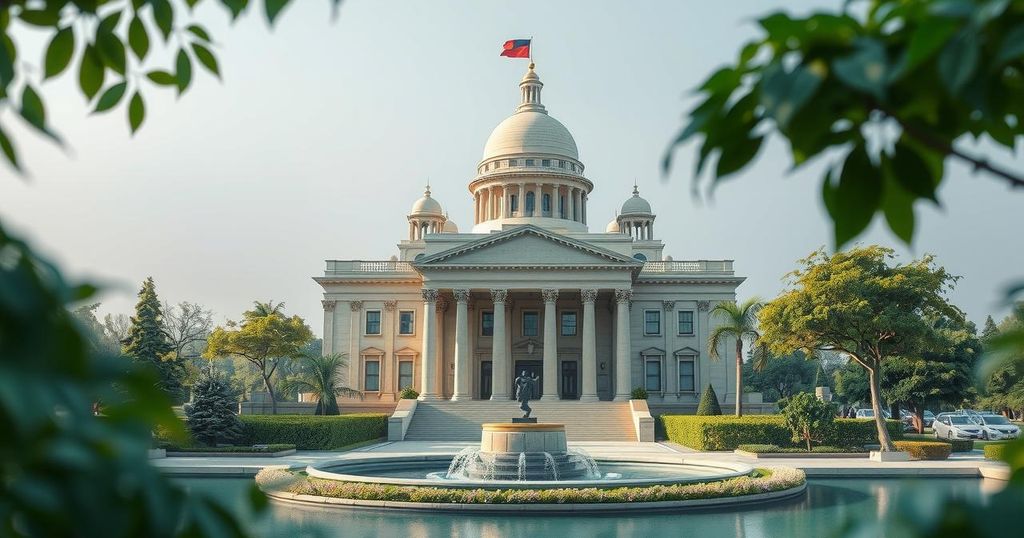Governor Siminalayi Fubara of Rivers State highlighted the barriers to good governance in Nigeria, attributing them to issues like a lack of accountability and weak institutions. He stressed the importance of active citizen engagement in demanding responsible leadership. The discussion also covered electoral integrity, the role of civil society, and the necessity for reforms in Nigeria’s governance structures.
Governor Siminalayi Fubara of Rivers State emphasized the critical issues affecting governance in Nigeria, attributing the ongoing struggle for effective governance to a lack of public accountability, weak institutions, and the passivity of citizens and civil society organizations. He made these remarks during the 6th Yearly Lecture hosted by SWAAYA Limited in Lagos, themed “Nigeria’s Socio-Political Challenges: Whose Fault, Leaders or the Led?”. The event gathered a diverse audience of politicians, media professionals, and experts discussing the path forward for governance in Nigeria.
Fubara noted that there is a symbiotic relationship between leadership and followership, insisting that the emergence of credible leaders depends on an active citizenry that demands accountability. He stressed that as long as citizens remain passive, the cycle of poor governance will continue. The governor attributed the country’s socio-political challenges, including economic stagnation and corruption, to historical issues related to governance, insisting on the need for a paradigm shift.
He also pointed out electoral issues such as violence, rigging, and voter intimidation, which hinder the rise of competent leaders. Fubara criticized tribal politics and the disengagement of some leaders from the populace, asserting that these factors negatively affect democracy in Nigeria. Furthermore, he remarked on society’s troubling tendency to support politicians based on ethnic or party affiliations rather than on their abilities.
The governor highlighted the essential roles of civil society and media in fostering accountability and demanding policy reforms. He urged both leaders and citizens to take their responsibilities seriously to combat leadership challenges and asserted that public interest should be at the focus of governance. Fubara called for ethical leadership, emphasizing that political parties need to prioritize candidates with integrity and competence for positive change to occur.
“Nigeria, we must break the cycle of poor leadership and passive followership by fostering a culture of civic engagement and ethical governance. Foreigners will not fix Nigeria for us. Until Nigerians take full ownership of the country’s problems and solutions, the cycle of poor governance and underdevelopment will persist.” – Gov. Siminalayi Fubara.
Former Ogun State Governor, Senator Gbenga Daniel, echoed Fubara’s sentiments on the challenges faced by Nigeria as being largely attributed to poor leadership. Additionally, Akinyemi Onigbinde, Executive Secretary of the Centre for Policy and Development Studies, urged politicians to adhere to proper standards to fortify democracy. Chief Gani Adams, the Aare Onakakanfo of Yorubaland, reiterated the importance of strong opposition in achieving good governance.
The discussion also featured insights from Chief Olabode George and managing director Gabriel Akinadewo, who focused on the need to differentiate between political maneuvering and substantive governance. Their inquiries emphasized the urgent requirement for political and judicial reforms in Nigeria as the nation confronts critical questions regarding its governance leading up to the 2027 presidential election.
Prominent figures present included Prince Adewole Adebayo, the 2023 Presidential Candidate of the Social Democracy Party (SDP), and Retired Navy Captain Omoniyi Olubolade, a former Military Administrator in Bayelsa and Minister of Police Affairs, among others.
In conclusion, the discourse led by Governor Siminalayi Fubara illuminates the dire need for active citizen engagement and accountability in governance to foster positive change in Nigeria. Highlighting the interplay between leaders and followers, the emphasis on ethical leadership, and the essential roles of civil society and media are critical to overcoming the prevailing socio-political challenges. The collective responsibility of both citizens and leaders is paramount to breaking the cycles of poor governance and ensuring a better future for the nation.
Original Source: businessday.ng




